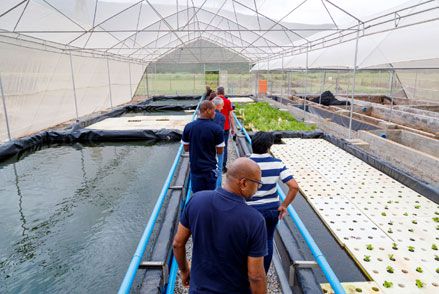
Farm foreman Excellent Sibuyi, Edward Msuthu and Dr Bev Sukhdeo, Sappi VP manufacturing & R&D
Amidst the rising unemployment rate among our country’s youth, Sappi has directed its social impact efforts toward initiatives that empower young people to access economic opportunities. In addition to its skills centres located at the Saiccor and Ngodwana Mills, Sappi Southern Africa has explored alternative approaches to tackle the country’s youth unemployment rate which stood at an alarming 44.3% in the fourth quarter of 2023.
One such innovative intervention is the Ngodwana Aquaponics project. After conducting market research and assessing the feasibility of establishing a community-operated aquaponics farm in the Eland’s Valley in Mpumalanga, Sappi joined forces with Standard Bank in May 2022. Jointly, this vision for meaningful social impact, centres on youth job creation projects, with a particular emphasis on agriculture.
Beyond addressing youth unemployment, the project’s primary goal is to enhance local food security by providing affordable, high-quality protein through locally farmed Tilapia Rendalli fish. In its initial phase, the project onboarded 30 local youths between September and November 2023.
The Ngodwana Aquaponics project not only upskilled local youths in the basics of aquaculture but also provided training in vegetable and herb production. To ensure overall profitability, the project diversified its offerings by including a range of high-end products for sale at the farm stall. These sought-after artisanal products, such as macadamia pesto, grapefruit marmalade, piquant capsicum peppers, tomato jam, and a hot chili sauce, supplement the income from fish production, allowing the venture to maintain an affordable price point.

Aquaponics tanks

High-end products for the farm stall
However, the true source of pride lies in the construction of the farm. The project ensured that all participating youths acquired a comprehensive set of skills necessary for every aspect of construction. From digging foundations to building structures, handling plumbing, wiring, and even basic welding, the tutors from the Ngodwana Skills Centre equipped them with the expertise needed to complete the construction to the highest standards.
The Ngodwana Nursery, which is adjacent to the Sappi Ngodwana Mill in Mpumalanga and which supplies more than 17 million seedlings and cuttings to Sappi Forests and other customers annually, was strategically chosen as the farm’s location. Its reliable power and water supply, provided at no extra cost, combined with the nursery management team’s dedication and passion, made it the ideal venue. Additionally, minimal licensing requirements — limited to Department of Health permits for fish transport and the farm shop — simplified the process.
The farm design was done by Sappi engineer-in-training Chelaine Maree, under the supervision of Henri Pereira from MyAquaponics, who also conducted the initial training of the group.
The partnership between Sappi and Standard Bank outlined specific roles, where Sappi would manage the project, onboard local youth, and oversee the design, development, and capital expenditure for building the farm. Meanwhile, Standard Bank committed to subsidising the youth stipends for two years, with their commitment extending until November 2024. The overarching goal is for the operation to achieve a breakeven point and become self-sustaining.
The farm will remain as a department of Sappi under the management of its Forestry and Skills Centre at least until 2027, and to use the blueprint created at Ngodwana Aquaponics to create similar farms at our nursery locations in rural areas elsewhere in South Africa.

Team members with baked goods

Mahlatsi Mathebula, Minenhle Malevu, Thabiso Sambo and Comfort Mgiba
A retail shop is currently being shop-fitted at the Ngodwana shopping centre and will be opened once the first fish have reached a saleable weight of 250 grams. The live fish that will be sold in the shop, in addition to the vegetables that are being grown, will serve as a welcome source of healthy low-cost food for families in the area, who currently travel some 60km to access food. In addition, local craftsmen will be able to sell their crafts in the shop, together with the beneficiated produce under the Eland’s Valley Craft Preserve brand.
“We believe that supporting neighbouring communities positively impacts our operations. Initiatives like this, which create economic opportunities, foster community growth and contribute to a stable, healthy ecosystem for our business,” comments Melanie Jacobs, Sappi Limited’s global process owner for talent, performance, and learning. “These initiatives empower youths, allowing them to channel their talents into productive and dignified economic activities, ultimately opening new doors for their future," she said.
Any profits generated by the operation will be reinvested into further community youth projects. This collaborative effort ensures that the Ngodwana Aquaponics project not only addresses youth unemployment but also contributes to local food security and economic empowerment.







































































